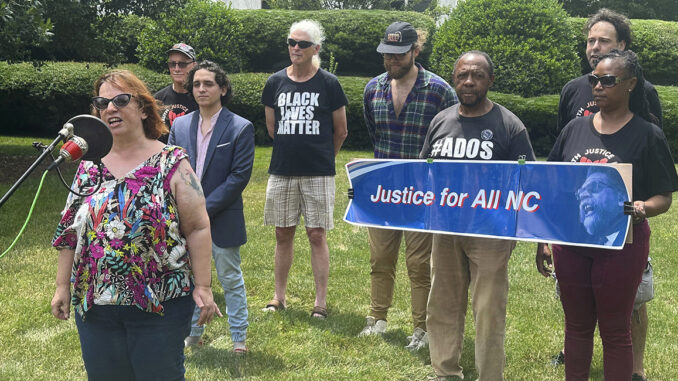
RALEIGH — Two lawsuits filed last week against the North Carolina State Board of Elections could impact what names show up on the November ballot.
The first lawsuit, filed on July 22 against the North Carolina State Board of Elections (NCSBE) seeks to compel certification of the Justice for All Party as a new political party and allow its candidates on the 2024 general election ballot.
The NCSBE rejected the Justice For All Party down party lines on July 16. It was the third time in a month the NCSBE had voted down the party’s certification despite two other parties — the Constitution Party and We The People Party — gaining approval.
The plaintiffs are Fayetteville citizens Johnny Thomas Ortiz II, Jimmie Gregory Rogers Jr. and Weldon Murphy. They are represented by attorneys from Nelson Mullins Riley & Scarborough LLP, including Phillip J. Strach, a familiar name in North Carolina election cases.
The lawsuit was filed in the U.S. District Court for the Eastern District of North Carolina’s Western Division. The filing alleges that the NCSBE failed to certify the Justice For All Party (JFA) despite meeting all legal requirements. According to the plaintiffs, that action violates their constitutional rights, including the right to vote for preferred candidates, free speech and association, and due process.
The lawsuit claims the board used improper procedures in investigating and rejecting JFA’s petition, such as relying on an unrepresentative voter sample and not providing the party adequate opportunity to address concerns. Notably, the suit points out that county boards had already validated more than 17,000 signatures.
The complaint also raises concerns about alleged partisan interference in the petition process. It cites objections raised by the North Carolina Democratic Party and Clear Choice Action, a group described as created by Democrats to limit third-party candidates.
“On information and belief, only Clear Choice Action, represented by Elias Law Group, has filed such a complaint,” the lawsuit states.
The lawsuit suggests the NCSBE’s actions were influenced by these interventions and states, “Plaintiffs are unaware of any effort by the NCSBE to investigate the Democratic operative’s conduct.”
The plaintiffs are requesting the court declare the NCSBE’s failure to certify JFA unconstitutional and order the board to certify JFA as a new party. They’re asking for this order to be issued no later than Aug. 19 to allow time for ballot printing before the Sept. 6 deadline for absentee ballot availability.
Additionally, the lawsuit seeks to enjoin the NCSBE from enforcing the July 1 deadline for new party certification and to ensure the inclusion of JFA’s candidates, including presidential candidate Cornel West, on North Carolina’s Nov. 5 general election ballot.
Late on July 26, House Speaker Tim Moore (R-Kings Mountain), House Rules and Operations Chair Rep. Destin Hall (R-Caldwell), and Election Law and Campaign Finance Chair Rep. Grey Mills filed an amicus brief in support of JFA.
“North Carolina House leaders argue that when determining which third parties will be on the ballot in the upcoming election, the NC State Board of Elections treated the Justice for All Party unfairly, betraying the partisan intent of the boards’ Democratic majority,” said the press release announcing the amicus filing.
The second lawsuit was filed by the North Carolina Democratic Party (NCDP) on July 25. The NCDP complaint was filed against the NCSBE in Wake County court and seeks to revoke the NCSBE’s recent certification of the We The People party. If successful, it would mean Robert Kennedy, Jr. would not be one of the presidential candidates that voters in North Carolina could choose from in November.
“The NCDP has an interest in competing fairly against other political parties and unaffiliated candidates in North Carolina,” the NCDP’s complaint states. “Allowing unaffiliated candidates to masquerade as political parties, as Kennedy and the WTP Party seek to do here, in violation of North Carolina law harms the electoral prospects of the NCDP and its candidates.”
Additionally, the NCDP argues it is harmed by having to “divert and expend additional resources to oppose WTP candidates the NCDP believes shouldn’t be allowed on the ballot.
As the 2024 election approaches, the outcome of these lawsuits could have significant implications in North Carolina, particularly on the presidential race where Vice President Kamala Harris has become the presumptive Democratic Party nominee following President Joe Biden’s announcement he would not be seeking reelection.



